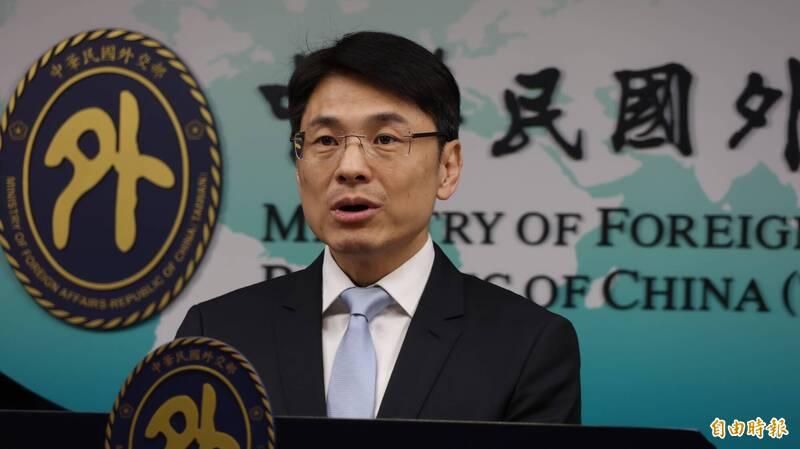The US House of Representatives' passage of a bill that supports Taiwan's return to the IMF is a sign of bipartisan US support for Taiwan’s international participation and resistance against China’s suppression of the nation, Ministry of Foreign Affairs spokesman Hsiao Kuang-wei (蕭光偉) said today.
It also reinforces Taiwan’s importance as a partner on the global stage, Hsiao said.
The House yesterday unanimously passed the Taiwan Non-Discrimination Act of 2025 (H.R. 910), which stipulates that the US secretary of the treasury, who also serves as the US governor to the IMF, should "vigorously support the admission of Taiwan as a member" in the institution.

Photo: Taipei Times file photo
The bill must be approved by the US Senate before the president can sign it into law.
The ministry thanked the House for unanimously passing the bill, Hsiao said.
It would continue to closely monitor developments and maintain ties with US lawmakers and Washington to keep building momentum in the push to expand Taiwan’s international participation, Hsiao said.
The Republic of China, Taiwan's official name, was a founding member of the IMF in 1944. However, nine years after the People’s Republic of China took Taiwan’s place in the UN in 1971, Beijing joined the IMF, effectively pushing Taiwan out.
If signed into law, the bill would “require the [US] Department of the Treasury to support Taiwan’s admission to the IMF or participation in activities of the Fund before it becomes a member.”
Joining the IMF would enable Taiwan to benefit from economic surveillance and technical assistance, and allow Taiwanese nationals to work at the institution.
The bill was proposed by US representatives Young Kim and Al Green.
China could try to use tariffs and stock market disruptions to destabilize Taiwan’s financial system, and joining the IMF would help Taipei access the resources required to counter these risks, the representatives said.
There would be three main benefits to Taiwan joining the IMF, said Darson Chiu (邱達生), an economics professor at Tunghai University in Taichung and director-general of the Confederation of Asia-Pacific Chambers of Commerce and Industry.
First, it would boost international recognition of Taiwan and its sovereign status, while assuring international investors and credit ratings agencies that Taiwan’s economic system is stable, Chiu said.
That would, in turn, improve Taiwan’s sovereign credit rating, make it easier to attract foreign investment and significantly elevate its global profile, he said.
Second, the IMF could assist in maintaining Taiwan’s economic and financial stability, Chiu said.
For example, South Korea received financial assistance from the IMF during the 1997 Asian financial crisis, and the IMF provided support to multiple countries during the European debt crisis, he said.
Third, the IMF has a robust team of economic experts, whose reports, research and resources could assist in bolstering Taiwan’s policy design and risk forecasting capabilities, Chiu said.
Taiwan would also be able to participate in annual meetings and share its views on international economic rules and policies, he added.
Additional reporting by CNA

Chinese spouse and influencer Guan Guan’s (關關) residency permit has been revoked for repeatedly posting pro-China videos that threaten national security, the National Immigration Agency confirmed today. Guan Guan has said many controversial statements in her videos posted to Douyin (抖音), including “the red flag will soon be painted all over Taiwan” and “Taiwan is an inseparable part of China,” and expressing hope for expedited reunification. The agency last year received multiple reports alleging that Guan Guan had advocated for armed reunification. After verifying the reports, the agency last month issued a notice requiring her to appear and explain her actions. Guan

GIVE AND TAKE: Blood demand continues to rise each year, while fewer young donors are available due to the nation’s falling birthrate, a doctor said Blood donors can redeem points earned from donations to obtain limited edition Formosan black bear travel mugs, the Kaohsiung Blood Center said yesterday, as it announced a goal of stocking 20,000 units of blood prior to the Lunar New Year. The last month of the lunar year is National Blood Donation Month, when local centers seek to stockpile blood for use during the Lunar New Year holiday. The blood demand in southern Taiwan — including Tainan and Kaohsiung, as well as Chiayi, Pingtung, Penghu and Taitung counties — is about 2,000 units per day, the center said. The donation campaign aims to boost

The Kaohsiung Tourism Bureau audited six hotels in an effort to prevent price gouging ahead of Korean band BTS’ concert tour in the city scheduled for Nov. 19, 21 and 22 this year. The bureau on Friday said that the audits — conducted in response to allegations of unfair pricing posted on social media — found no wrongdoing. These establishments included the local branches of Chateau de Chine, Hotel Nikko, My Humble House, and Grand Hai Lai, it said, adding that the Consumer Protection Commission would have penalized price gougers had the accusations been substantiated. The bureau said the Tourism Development Act

The Central Weather Administration (CWA) said a magnitude 4.9 earthquake that struck off the coast of eastern Taiwan yesterday was an independent event and part of a stress-adjustment process. The earthquake occurred at 4:47pm, with its epicenter at sea about 45.4km south of Yilan County Hall at a depth of 5.9km, the CWA said. The quake's intensity, which gauges the actual effects of a temblor, was highest in several townships in Yilan and neighboring Hualien County, where it measured 4 on Taiwan's seven-tier intensity scale, the CWA said. Lin Po-yu (林柏佑), a division chief at the CWA's Seismological Center, told a news conference